Inaugural embedding depth
« previous post | next post »
Following up on yesterday's "Embedding depth" post, I've done the same analysis to the 62 Inaugural Addresses of U.S. presidents. (Actually, 61 of them — I had to omit John Adams' 1797 address, because its 35th sentence is 797 words long, which made the standard version of the Berkeley Neural Parser break down in tears…)
As I noted in "Complexity" (9/7/2005), these texts exhibit the general historical trend towards decreasing sentence length:
It won't be surprising to see that the mean parse depth (i.e. the number of non-terminal nodes between the root of the sentence and a given token) follows a similar declining path:
And likewise the mean clause depth (which is the number of S-nodes along the path from the root to a given token):
So it won't be a surprise to see that the mean parse depth correlates with the mean sentence length:
And similarly for the mean clause depth:
It's not surprising that depth measures correlate with sentence length — to some extent this is inevitable, and in a consistent writing (or speaking) style the correlation will be nearly perfect. But it seems likely that some styles (and writers) are genuinely more hypotactic or paratactic than others, and those differences should be quantified as different relationships between length and embedding measures. More on this later, I hope…
Some other relevant past posts:
"Inaugural embedding", 9/9/2005
"Inaugural anticipation", 1/20/2009
"Presidential parataxis?", 1/24/2009
"Inaugural embedding again", 1/22/2017
As a side note, I find Adams' 797-word sentence as hard to follow as the parser did — though my problems are semantic and rhetorical rather than simple overloading of a word-sequence list. Perhaps a more historically-informed reader can interpret it for us, in the context of the strange 1796 election that it followed, and the passage earlier in the address where Adams says
In the midst of these pleasing ideas we should be unfaithful to ourselves if we should ever lose sight of the danger to our liberties if anything partial or extraneous should infect the purity of our free, fair, virtuous, and independent elections. If an election is to be determined by a majority of a single vote, and that can be procured by a party through artifice or corruption, the Government may be the choice of a party for its own ends, not of the nation for the national good. If that solitary suffrage can be obtained by foreign nations by flattery or menaces, by fraud or violence, by terror, intrigue, or venality, the Government may not be the choice of the American people, but of foreign nations. It may be foreign nations who govern us, and not we, the people, who govern ourselves; and candid men will acknowledge that in such cases choice would have little advantage to boast of over lot or chance.
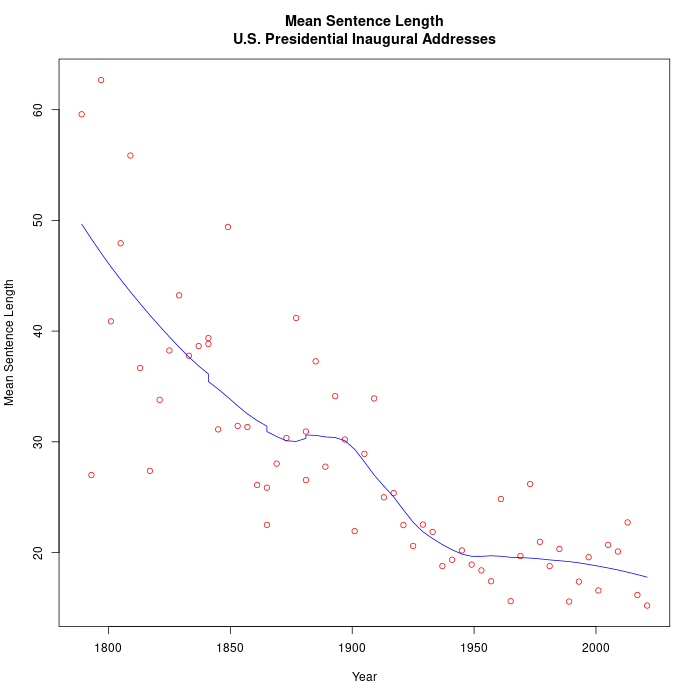
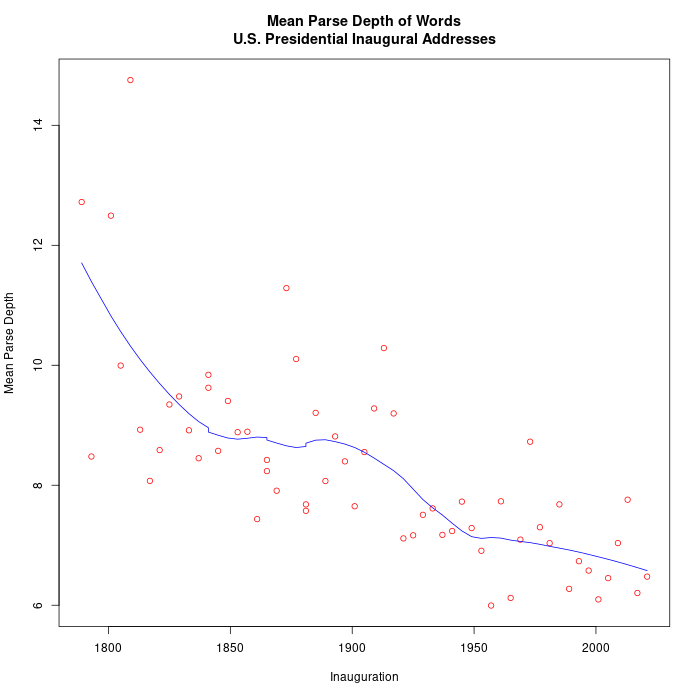
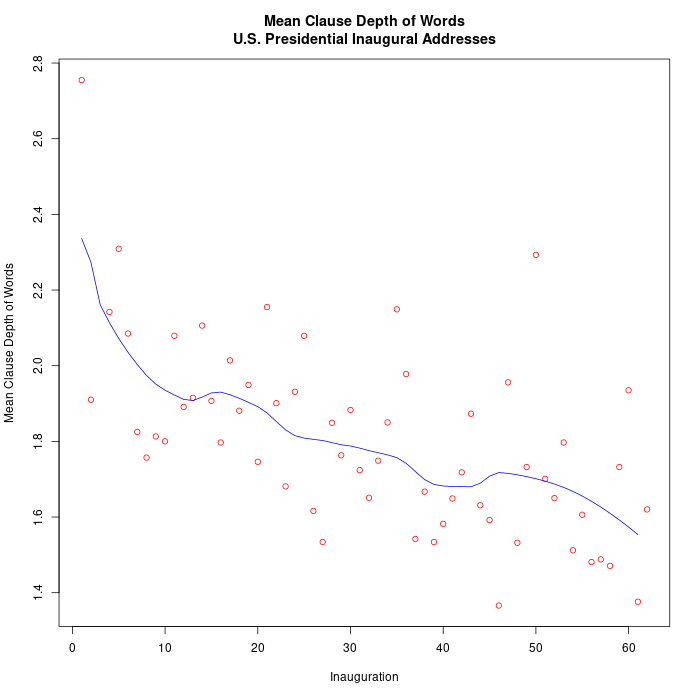
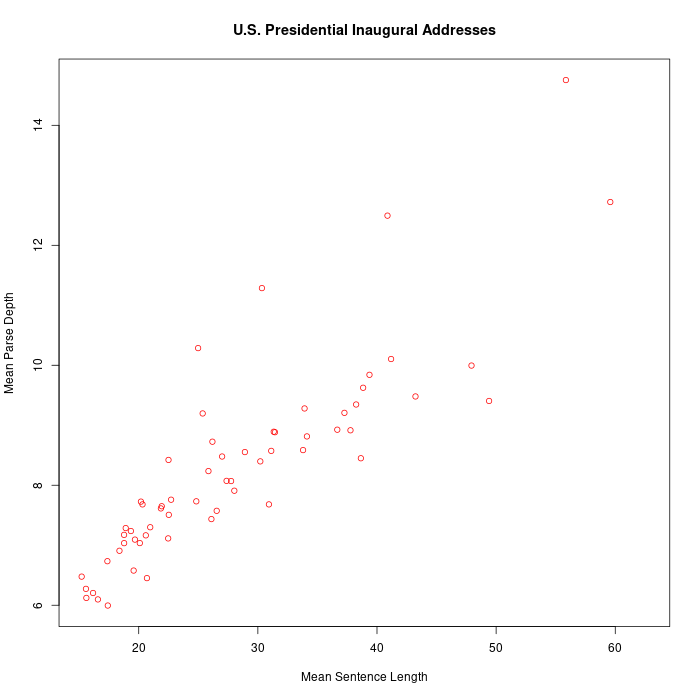
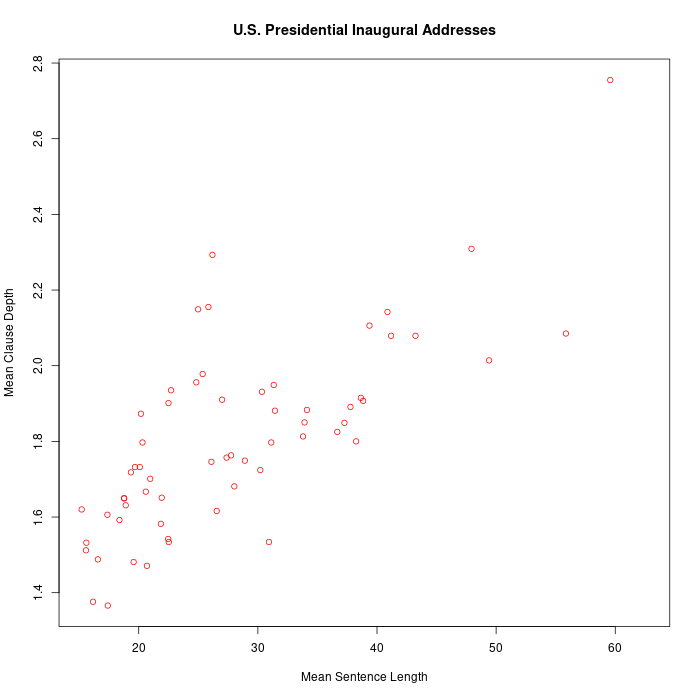
Peter Taylor said,
November 29, 2022 @ 9:12 am
The 797-word sentence seems straightforward enough to me.
I don't see a connection with the earlier passage. Here he seems to be saying, "Since I'm taking over from someone whose superfluous virtues make him an example to follow, although I shouldn't blow my own trumpet, I hope I may be excused for saying why I'm the man for the job". The "sagacious injunction" would be the one implied by the last sentence of the previous paragraph:
Francois Lang said,
November 29, 2022 @ 9:25 am
I wonder if the Berkeley Neural Parser enjoyed chewing through William Henry Harrison's inaugural address — all 8,445 words of it!
Taylor, Philip said,
November 29, 2022 @ 10:28 am
If [15 or so different abstract notions] will permit me to at least partially comply with your wishes, then I shall do my very best to do so.
Mark Liberman said,
November 29, 2022 @ 10:29 am
@Francois Lang: The overall length is not a problem — the parser divides the input into sentences and deals with them one at a time, and it had no problems with (for example) the 100,000-odd words of Dickens' American Notes, since the longest sentence in that work is 235 tokens. I believe its internal sentence buffer will accommodate up to 512 tokens.
GeorgeW said,
November 29, 2022 @ 10:35 am
I'm curious who has the highest and lowest mean sentence length since 2000.
Thomas Shaw said,
November 29, 2022 @ 10:52 am
I agree with Peter Taylor's analysis above, and I'd add that the example that congress recommended future presidents imitate is George Washington's voluntary retirement after two terms as president.
Mark Young said,
November 29, 2022 @ 10:59 am
GeorgeW: Based on what's shown in the chart (and assuming the lengths are not wildly different between first and second inaugurations), from longest to shortest would be Obama (1st & 3rd highest means), Bush (2nd & 4th), Trump (5th), Biden (6th).
Peter Taylor said,
November 29, 2022 @ 12:02 pm
PS I, of course, meant superlative when I typed superfluous.